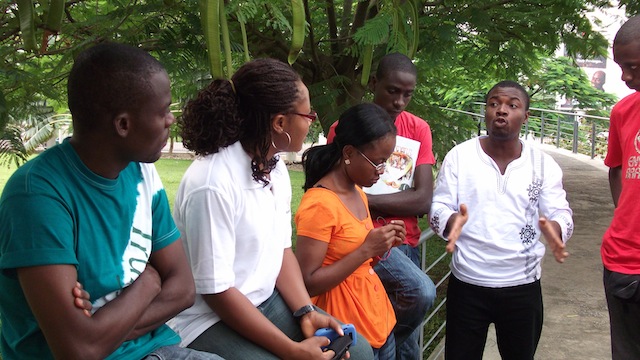Africa
Overcoming Barriers to Youth Participation in Good Governance in Nigeria -By Abigail Wapakta
For Nigeria to achieve true development and sustainable governance, it must break down the structural and societal barriers preventing youth participation. This is not merely a favor to the youth—it is a necessity for national progress. Young Nigerians have the numbers, the talent, and the drive. What they need is an environment that supports their aspirations and respects their voice. By working together, Nigeria can unlock the immense potential of its youth and secure a brighter, more inclusive future for all.

In every thriving democracy, the involvement of young people in governance is not only essential but pivotal to sustainable development. Nigeria, with one of the largest youth populations in the world—estimated at over 60% of its 200+ million citizens—stands at a critical juncture. If harnessed correctly, this demographic asset could significantly reshape the country’s political and socio-economic landscape. However, several barriers continue to hinder meaningful youth participation in governance, posing challenges to the nation’s growth and stability.
One of the foremost barriers is political exclusion. Despite their numbers, Nigerian youths often find themselves on the sidelines of political power. The structure of political parties, which are largely dominated by older politicians, does not typically encourage youth representation. Even though laws like the “Not Too Young to Run” Act have reduced age restrictions for political office, young Nigerians still face resistance when attempting to occupy positions of influence.
Another major challenge is economic disenfranchisement. Participating in politics in Nigeria often requires significant financial resources—ranging from party nomination forms to campaign expenses. Many Nigerian youths, grappling with high unemployment and underemployment rates, simply cannot afford to compete. This economic barrier effectively shuts out a vast majority of potential young leaders who might otherwise contribute fresh ideas and energy to governance.
Additionally, lack of political education and mentorship further undermines youth involvement. A good number of young Nigerians are not well-versed in civic duties, governance processes, or policy development. This knowledge gap leaves many disillusioned or uninterested in political participation. Schools, civil society organizations, and community leaders need to do more to promote civic education and mentorship among the youth.
Cultural and societal perceptions also play a role in restricting youth involvement. In many Nigerian communities, leadership is traditionally associated with age and seniority. This perception, though rooted in respect for elders, often translates into marginalization of the youth in decision-making processes. Breaking this mindset requires a cultural shift that acknowledges the competence and capacity of young people.
Gender inequality adds another layer to the issue, especially for young women. Social norms, limited access to resources, and gender-based discrimination significantly reduce female youth participation in governance. This imbalance means the country misses out on the valuable insights and contributions of a large portion of its population. Encouraging and empowering young women to engage in politics is vital for inclusive governance.
Moreover, youth apathy must be acknowledged as a challenge, albeit one rooted in systemic disenchantment. Years of failed promises, corruption, and exclusion have led to widespread distrust in government among young people. Many feel their votes do not count or that politics is inherently dirty. To overcome this, Nigeria must work toward building trust through transparency, accountability, and genuine inclusion.
Despite these barriers, Nigerian youths have consistently shown resilience and a passion for positive change. Movements like #EndSARS, which brought global attention to police brutality and governance failures in 2020, showcased the power and unity of Nigerian youth. Though the movement faced repression, it was a strong signal that young Nigerians are ready to demand better and lead the change they want to see.
There are also growing examples of young Nigerians making meaningful contributions to governance. From youth-led NGOs working on electoral reform and transparency to young professionals joining government agencies and influencing policy, the tide is gradually turning. These stories need to be highlighted and celebrated to inspire more young people to engage.
To fully overcome the barriers, multi-stakeholder collaboration is essential. Government institutions must create and enforce policies that promote youth inclusion. Political parties need to intentionally support young candidates, not just as campaign tools but as true decision-makers. The private sector can play a role by funding civic education and leadership development programs. Civil society must continue to advocate for and mentor emerging youth leaders.
Digital technology and social media present unique opportunities to bridge the gap between governance and the youth. These tools have already proven effective in organizing protests, driving voter education, and holding leaders accountable. Investing in digital literacy and access for youth, especially in rural areas, can further deepen democratic participation.
Furthermore, youth themselves must rise to the challenge by equipping themselves with the necessary knowledge, integrity, and leadership skills. They must engage not just during elections, but consistently—in town halls, public hearings, and policy discussions. Leadership is not merely about winning political office, but about influencing policies and programs that affect communities.
For Nigeria to achieve true development and sustainable governance, it must break down the structural and societal barriers preventing youth participation. This is not merely a favor to the youth—it is a necessity for national progress. Young Nigerians have the numbers, the talent, and the drive. What they need is an environment that supports their aspirations and respects their voice. By working together, Nigeria can unlock the immense potential of its youth and secure a brighter, more inclusive future for all.
Abigail Wapakta Department of Mass Communication Borno State University, Maiduguri.
























